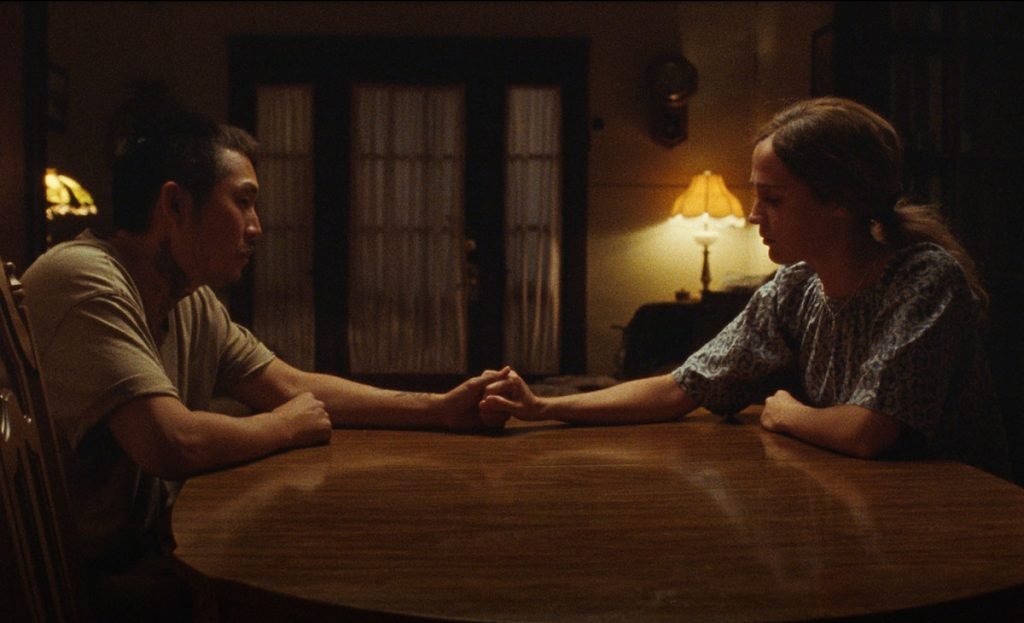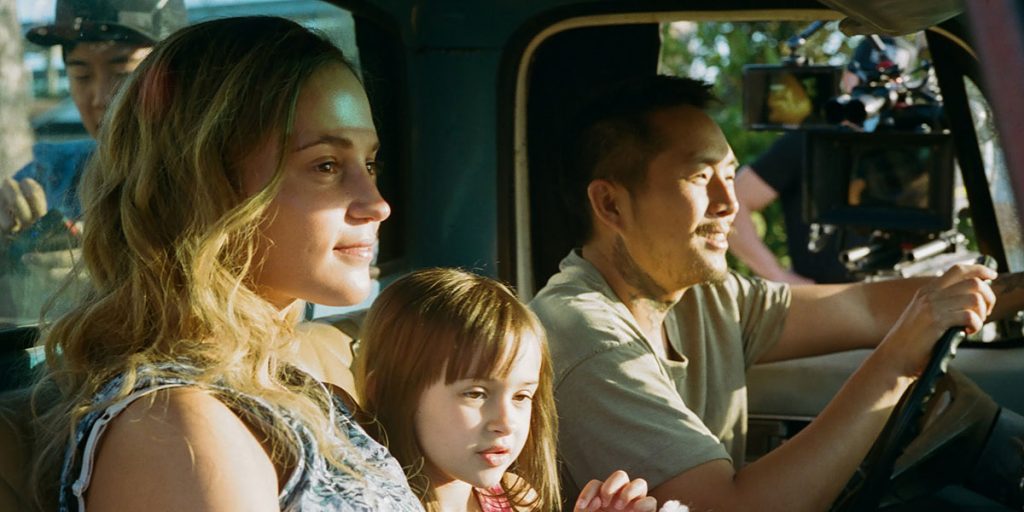Blue Bayou supplements its social message with a sentimental yet sincerely stirring story anchored by touching turns from Justin Chon and Alicia Vikander.
For a nation built by immigrants, America is oddly obsessed with proving who “really belongs here” (even though the answer is none of us, since this is stolen land anyway, but I digress). That theme is cooked into the core of Blue Bayou, Justin Chon’s (Gook) deportation drama that specifically hones in on the legal chaos caused by the Child Citizenship Act of 2000 – a law that ensured automatic U.S. citizenship to intercountry adoptees, but only if they were younger than 18 years of age by the time of the law’s effective date, February 27, 2001. Therefore, thousands of intercountry adoptees – most of whom were born before 1983 – did not qualify for U.S. citizenship and still lack citizenship today, sometimes even without their knowledge.
As a result, many of the individuals in this group have been deported to their countries of origin – countries that they’ve never known and have no association with, having been brought to America at a very young age. Legally, these individuals “aren’t Americans.” And yet, after having lived here their whole lives and making this country their home, how can we call them anything but? If they aren’t “real Americans,” what does being an American even mean? Chon sets out to answer all these questions and more – additionally assessing the tragic familial turmoil brought about by this law – in the devastating but deeply felt Blue Bayou.
The film opens on a job interview that couldn’t possibly be going worse for Antonio LeBlanc (Chon), a current tattoo artist looking for a new profession to help him provide for his family – wife Kathy (Alicia Vikander, of Ex Machina and The Green Knight) and stepdaughter Jesse (newcomer Sydney Kowalske) – as he and Kathy have a child of their own on the way. The interviewer wastes no time digging into the darkness of Antonio’s past – including two felonies for grand theft auto – and making racist remarks, such as asking where Antonio is “really from.” Naturally, he doesn’t get the job. Whilst upset, Antonio can’t be sad for too long, comforted by the love and support of his little family, with all of their conversations radiating convincing compassion and camaraderie.
In fact, all seems to be looking up for the tight-knit trio; that is, until an unfortunate altercation with a deeply prejudiced police officer (Emory Cohen, of Brooklyn) sees Antonio thrown into jail and later apprehended by ICE (the U.S. Immigration and Customs Enforcement), where it’s revealed that Antonio is not actually a U.S. citizen. What follows is a race against time to find the funds to pay obscenely expensive lawyers and build a case to argue for Antonio’s continued stay in America, or else he’ll be sent back to South Korea – a country he left when he was just three.

It can be said that Blue Bayou is an “issue movie” – not-so-subtly spotlighting the suffering caused by the Child Citizenship Act of 2000 and hoping to push audiences into action after witnessing the wrenching woes on display – but it supplements its messaging with a sincerely moving narrative that prioritizes its protagonists over its social commentary. If Chon (who writes and directs here) were to simply tell us all the things wrong with the Child Citizenship Act of 2000, we’d likely be appalled that such an evil law still exists, but we’d feel these emotions in our head, not in our heart. By creating such charming and compelling characters as Antonio and Kathy to put a face to these pains, this plight becomes personal. These two are absolutely imperfect individuals, prone to making misguided decisions from time-to-time, but their love for one another is so real – and Chon and Vikander’s performances feel so palpably lived-in – that we come to care for them directly and wish to protect them from all their troubles, and it’s as if we too are experiencing this adversity right alongside them. Additionally, Chon skillfully subverts all stereotypes you may have of this family – whether they be related to immigrants, Southerners, or any other group – producing one-of-a-kind personalities that leap off the screen due to their distinctiveness.
One could accuse Chon’s script of being a little too overwrought towards the end – particularly when it comes to a few superfluous tragic twists at the start of the third act – but, for the most part, the writer/director anchors his story in authenticity, with scenes that engage with the emotions inherent in this family’s fight in an honest manner, foregoing exaggeration for earnestness. Chon dialogue is nimbly naturalistic, with every exchange eschewing soapiness for a more shrewd handling of the subject matter, especially in the genuine give-and-take between Chon’s Antonio and Vikander’s Kathy, which allows both husband and wife ample time to share their purest perspectives on their current predicament.
It’s mightily impressive how well Chon is able to capture the ebbs and flows of this married couple’s relationship through these trying times, with Antonio being allowed the space to rail against this racist society but Kathy also being granted the ability to criticize Antonio when his aberrant actions put their family at risk or further jeopardize their case for his citizenship. Also of note is the connection Antonio forms with Linh Dan Pham’s (Mr. Nobody, Ninja Assassin) Parker, a Vietnamese refugee and cancer patient on her last leg of life whom he meets at the hospital when visiting Kathy one day. Through their communication, Antonio comes to learn more of the Asian culture that’s always been foreign to him, and Chon delicately depicts the integration of his two identities – American and Asian – thanks to Parker’s guidance with careful consideration.
Chon’s directing is undoubtedly daring – as his gritty grasp on the Louisiana atmosphere emphasizes the harshness of their environment and his fearless handling of a few fantastical flashback sequences evokes the feel of the work of Wong Kar-wai – but it’s his stripped-down, soulful acting that truly makes this story sing. Chon fully disappears in the role of Antonio to the point where the actor and the character become one, allowing himself to experience these emotions entirely, as if they were his own and he is the one truly enduring this legislative torment. He wears this weariness on his face even when its momentarily camouflaged by a slight smirk, illustrating that he can never truly be free in the land he calls home, always on the run from the antagonistic forces that want to send him away.
The Oscar-winning Vikander matches his commitment with a captivating turn of her own as a strained spouse struggling to ensure her family’s emotional and financial survival through this onerous ordeal, baring her soul in the few scenes where the weight of the world becomes too big a burden to shoulder any longer. Kowalske is a fantastic find as the jubilant Jesse, delivering one of the most poignant child performances since Jacob Tremblay in Room and tearing your heart out in the tear-jerking climax. The aforementioned Pham is a pleasing presence as the patient Parker, while Mark O’Brien (Marriage Story, Ready or Not) terrifically tackles tough role of Kathy’s cop ex-lover and Jesse’s absent dad who comes to play a crucial role in Antonio’s case.
Blue Bayou wears its heart on its sleeve as it shouts its critiques of the Child Citizenship Act of 2000 from the rooftops, and while such unabashed sentimentality may not be every viewer’s cup of tea, it’s hard not to be swept up by Justin Chon’s stark soulfulness nonetheless, with writing that doesn’t cut corners and hones in on the harshness of Antonio’s reality – and the reality of tens of thousands of intercountry adoptees in America today. Anchored by touching turns from Chon, Vikander, and Kowalske, Blue Bayou is the rare “issue movie” that transcends its typical trappings, cutting straight to the core of the cultural conversation surrounding current citizenship struggles with riveting rage.
Focus Features released Blue Bayou in US theaters September 17, 2021. The film was released in cinemas in the UK by Universal Pictures on December 3. The film is now available to watch on digital and on demand.

